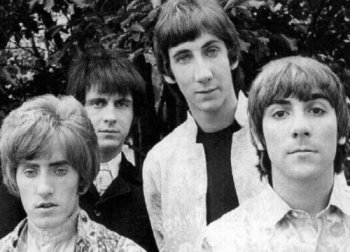*****
The Who are an English rock band formed in 1964. The primary lineup was guitarist Pete Townshend, vocalist Roger Daltrey, bassist John Entwistle and drummer Keith Moon. They became known for energetic live performances, are one of the most influential rock bands of the 1960s and '70s, and recognised as one of the greatest rock and roll bands of all time. They were inducted into the Rock and Roll Hall of Fame in 1990, their first year of eligibility. According to the New York Times, The Who have sold 100 million records.
The Who rose to fame in the United Kingdom with a pioneering instrument destruction stage show and a series of top ten hit singles (including "My Generation") and top five albums, beginning in 1965 with "I Can't Explain". They hit the top ten in the US in 1967 with "I Can See for Miles". The 1969 release of Tommy was the first in a series of top five albums in the US, followed by Live at Leeds (1970), Who's Next (1971), Quadrophenia (1973), and Who Are You (1978).
Moon died in 1978, after which the band released two studio albums, the top five Face Dances (1981) and the top ten It's Hard (1982), with drummer Kenney Jones, before disbanding in 1983.
In the early days, The Who was a trad jazz band started by Townshend and Entwistle called The Confederates. Townshend played banjo and Entwistle played the French horn, an instrument he had started playing while in the school band. Daltrey met Entwistle walking down the street with a bass slung over his shoulder and asked him to join his band called The Detours. Entwistle suggested Townshend as an additional guitarist. In early days the band was influenced by American blues and country music, playing mostly rhythm and blues. The lineup was Daltrey on lead guitar, Townshend on rhythm guitar, Entwistle on bass, Doug Sandom on drums, and Colin Dawson on vocals. After Dawson left, Daltrey moved to vocals and Townshend became sole guitarist. In 1964 Sandom left and Keith Moon became drummer.
The Detours changed to The Who in 1964 and, with the arrival of Moon that year, the line-up was complete. However, for a short period in 1964, under the management of mod Peter Meaden, they changed to The High Numbers, releasing "Zoot Suit/I'm the Face", a single to appeal to mod fans. When it failed to chart, the band fired Meaden and reverted to The Who. They became popular among the British mods, a 1960s subculture involving cutting-edge fashions, scooters and music genres such as rhythm and blues, soul, and beat music.
In September 1964, at the Railway Tavern in Harrow and Wealdstone, London, Townshend's physical performance resulted in accidentally breaking the head of his guitar through the ceiling. Angered by sniggers from the audience, he smashed the instrument on the stage. He picked up another guitar and continued the show. A large crowd attended the next concert, but Townshend declined to smash another guitar. Instead, Moon wrecked his drumkit. Instrument destruction became a staple of The Who's shows for several years. The incident at the Railway Tavern is one of Rolling Stone magazine's "50 Moments That Changed the History of Rock 'n' Roll".
The band crystallised around Townshend as primary songwriter and creative force. Entwistle made songwriting contributions. Moon and Daltrey contributed songs in the 60s and 70s.
The Who's first release, and first hit, was January 1965's "I Can't Explain", influenced by the Kinks with whom they shared American producer Shel Talmy. The song was first played in the USA on WTAC AM 600 in Flint, Michigan, by DJ Peter C Cavanaugh, where Moon drove a car into a hotel pool during his 20th birthday (Moon claimed it was his 21st so he could drink). The song was a top 10 hit in the UK and was followed by "Anyway, Anyhow, Anywhere", song credited as composed by Townshend and Daltrey, though Townshend implied Daltrey assisted in songwriting without credit in the liner notes to Meaty Beaty Big and Bouncy.
The debut album My Generation (The Who Sings My Generation in the U.S.) released the same year. It included "The Kids Are Alright" and the title track "My Generation". Subsequent hits, such as the 1966 singles "Substitute", about a young man who feels like a fraud, "I'm a Boy" about a boy dressed as a girl, and "Happy Jack" about a mentally disturbed young man, show Townshend's use of sexual tension and teenage angst. More hits followed, including "I Can See for Miles" and the 1968 single "Magic Bus".
Although successful as a singles band, Townshend wanted The Who's albums unified rather than collections of songs. Townshend said "I'm a Boy" was from a projected opus, the first sign of which came in the 1966 album A Quick One, which included the storytelling medley "A Quick One While He's Away", which they referred to as a mini opera, and which has been called the first progressive epic.
A Quick One was followed by The Who Sell Out in 1967, a concept album like an offshore radio station, complete with humorous jingles and commercials which included a mini rock opera called Rael (whose closing theme ended up on Tommy), as well as The Who's biggest US single, "I Can See for Miles". The Who destroyed equipment at the Monterey Pop Festival that year and repeated the routine on the Smothers Brothers Comedy Hour with explosive results as Moon detonated his drumkit. Supposedly, too much explosive was used in the drum kit, resulting in damage to Townshend's hearing. In 1968, The Who headlined the first Schaefer Music Festival in New York City's Central Park. Also that year, Townshend became the subject of the first Rolling Stone interview. Townshend said he was working on a full-length rock opera. This was Tommy, the first work billed as a rock opera and a landmark in modern music.
